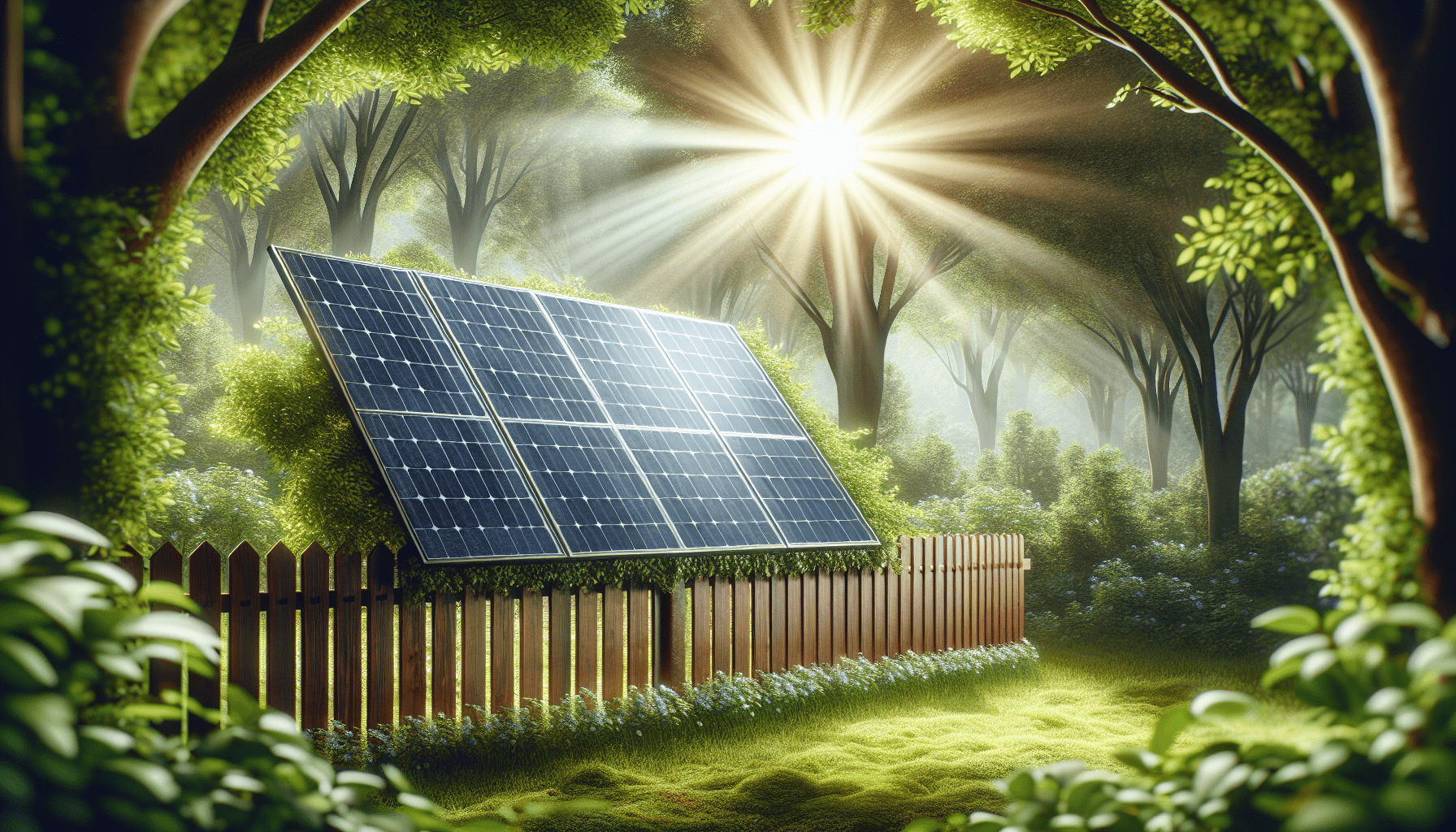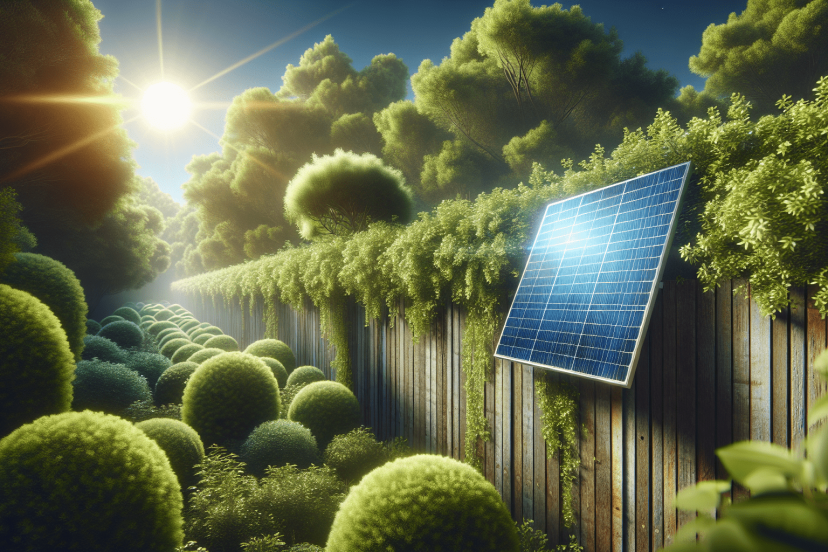Harnessing Solar Power for Your Fence: The Ultimate Energizer Guide
As an Amazon Associate, I earn from qualifying purchases, at no additional cost to you. Disclaimer
Have you considered the benefits of harnessing solar power for your fence? It may sound like a futuristic concept, but it’s more accessible and practical than ever. Solar power fence energizers are game-changers when it comes to maintaining and securing your property. Let’s explore how you can use this technology to your advantage and what factors to consider in your quest for the ideal solar power solution.
Discover Solar-Powered Generators
Understanding Solar Power Fence Energizers
Solar power fence energizers convert sunlight into electrical energy to power an electric fence. These systems are particularly beneficial for remote areas where conventional power sources are unavailable or unreliable. Not only do they help in containing animals and enhancing security, but they also contribute to environmental sustainability by utilizing a renewable energy source.
How Do Solar Fence Energizers Work?
At their core, solar fence energizers consist of a solar panel, a rechargeable battery, and an energizer unit. During the day, the solar panel collects sunlight and converts it into electricity, which is then stored in the battery. The energizer unit uses this stored energy to generate a consistent electric pulse that flows through the fence wires, creating an electric barrier.
Advantages of Solar Fence Energizers
Opting for solar fence energizers comes with various benefits. Here are a few notable advantages:
- Cost Savings: Reduce electricity bills as they depend on renewable solar energy.
- Environmental Impact: Lower carbon footprint due to the use of clean energy.
- Portability: Easy to install and move around compared to traditional wired systems.
- Reliability: Functions even in remote locations without access to the power grid.
Key Components of a Solar Fence Energizer System
Understanding the different components of a solar fence energizer system can help you make informed decisions. Here’s a breakdown:
| Component | Function |
|---|---|
| Solar Panel | Captures and converts sunlight into electricity. |
| Rechargeable Battery | Stores electrical energy for use during non-sunny periods. |
| Energizer Unit | Produces electric pulses to power the fence. |
| Fence Wires | Conduct electricity around the perimeter of the fenced area. |
| Ground Rods | Complete the circuit by grounding the electric system. |
Choosing the Right Solar Fence Energizer
Selecting the right solar fence energizer involves understanding your specific needs and the conditions under which your fence will operate. Let’s discuss the factors you should consider.
Assessing Your Power Needs
Determine the power requirements of your fence. This will depend on the length of the fence and the type of animals or security threats it needs to deter. Energizers are rated by the amount of voltage they can deliver and the miles of fence they can support.
Battery Capacity and Solar Panel Size
Pay attention to the capacity of the rechargeable battery and the size of the solar panel. Larger panels collect more sunlight and charge batteries faster, while bigger batteries store more energy for longer periods without sunlight.
Durability and Weather Resistance
Select energizers that are built to withstand harsh outdoor conditions. Look for waterproof or weatherproof features to ensure long-lasting performance even in extreme weather.
Maintenance and Ease of Use
Consider the maintenance requirements and user-friendliness of the system. Opting for an energizer that is easy to set up, operate, and maintain will save you time and effort.

Click Here to Reduce Your Energy Bills with Solar
Installation and Maintenance Tips
Proper installation and regular maintenance are crucial for optimal performance of your solar fence energizer. Here are some practical tips to guide you through the process.
Installing Your Solar Fence Energizer
- Positioning the Solar Panel: Place the solar panel in a location that receives maximum direct sunlight, preferably facing south in the northern hemisphere and north in the southern hemisphere.
- Mounting the Energizer Unit: Mount the energizer unit securely near the fence and away from the ground to avoid damage and exposure to moisture.
- Connecting the Wires: Attach the fence wires to the energizer unit following the manufacturer’s instructions. Ensure that connections are tight and secure.
- Setting Up Ground Rods: Drive the ground rods into moist soil near the fence. Connect the ground terminal of the energizer to the rods with insulated wire to complete the circuit.
Maintenance Practices
Regular checks and maintenance ensure that your system operates efficiently:
- Clean Solar Panels: Dust and debris can reduce the efficiency of your solar panel. Clean it periodically with a soft cloth.
- Inspect Fence Wires: Check for signs of wear, corrosion, or breakage and repair any damages promptly.
- Monitor Battery Health: Keep an eye on the battery’s charge level and replace it if it shows signs of deterioration.
- Test the Energizer: Use a voltage tester to ensure the energizer is producing the correct electric pulses and troubleshoot any issues that arise.
Practical Applications of Solar Fence Energizers
Solar fence energizers have versatile applications, making them useful in various scenarios. Here are some practical uses.
Agriculture and Livestock Management
Farmers and ranchers can use solar fence energizers to contain livestock and protect crops from wild animals. This solution is particularly beneficial in remote farmland areas.
Residential Security
Homeowners can enhance perimeter security around their properties using solar fence energizers. This can deter potential intruders and add an extra layer of protection.
Wildlife Conservation
Agencies involved in wildlife conservation can use solar fence energizers to create boundaries that protect endangered species from poachers or predators.
Recreational Properties
Owners of recreational properties such as campsites or hunting lodges can use solar fence energizers to secure the area and manage animal activity.

Environmental and Economic Impact
The use of solar power for fence energizing demonstrates significant environmental and economic advantages. Let’s delve into the specifics:
Reducing Carbon Footprint
Solar fence energizers contribute to carbon footprint reduction by relying on renewable energy instead of fossil fuels. Over time, this can significantly decrease greenhouse gas emissions.
Cost-Efficiency
Though the initial investment may be higher, solar fence energizers minimize long-term costs by eliminating monthly electricity bills. Moreover, they require minimal maintenance, further reducing expenses.
Energy Independence
Solar energizers provide energy autonomy, especially in off-grid areas. This independence ensures that your fencing system remains operational regardless of power outages or fluctuations.
Commonly Asked Questions
Addressing some frequently asked questions can further help clarify any doubts you might have about solar fence energizers.
How long do solar fence energizers last?
A well-maintained solar fence energizer can last anywhere from 5 to 15 years. Regular maintenance and timely replacement of batteries can extend its lifespan.
Can solar fence energizers work in cloudy weather?
Yes, solar fence energizers can still work in cloudy weather, though their efficiency may reduce. The system stores excess energy in the battery on sunny days, ensuring a consistent power supply during overcast conditions.
Are solar fence energizers safe for humans and animals?
When used correctly, solar fence energizers are safe. The electrical pulses are designed to deter rather than harm. However, precautions should be taken to avoid unnecessary contact.
Troubleshooting Common Issues
Even with the best systems, you might encounter some issues. Here are common problems and how to address them:
Low Voltage Output
If your energizer is producing low voltage, check the following:
- Solar Panel Placement: Ensure it’s in a sunny location.
- Battery Charge: Verify if the battery is fully charged.
- Wire Connections: Tighten any loose connections.
- Ground Rods: Ensure they are properly installed in moist soil.
Short Circuiting
A short circuit in your fence can occur due to:
- Broken Wires: Replace any damaged wires.
- Vegetation Contact: Trim any plants or grass touching the fence wires.
Battery Issues
If the battery isn’t holding charge:
- Age: Batteries generally need replacement every 3-5 years.
- Clean Contacts: Ensure the battery contacts are clean and free of debris.
Future of Solar Fence Energizers
The future looks promising for solar fence energizers with continuous advancements in technology. Anticipated improvements include:
- Enhanced Battery Technology: Longer-lasting and more efficient batteries that store more power.
- Smart Monitoring Systems: Integration with smart technology for remote monitoring and adjustments.
- Increased Efficiency: More efficient solar panels that generate more power even in low-light conditions.
By staying informed about these advancements, you can ensure your system remains cutting-edge and effective.
Final Thoughts
Harnessing solar power for your fence with an energizer system is a formidable way to combine technology with sustainability. By choosing the right components, ensuring proper maintenance, and understanding the myriad applications and benefits, you can create a robust and efficient fencing solution. Embrace this innovative approach to secure, manage, and protect your property while making a positive environmental impact. Happy fencing!

